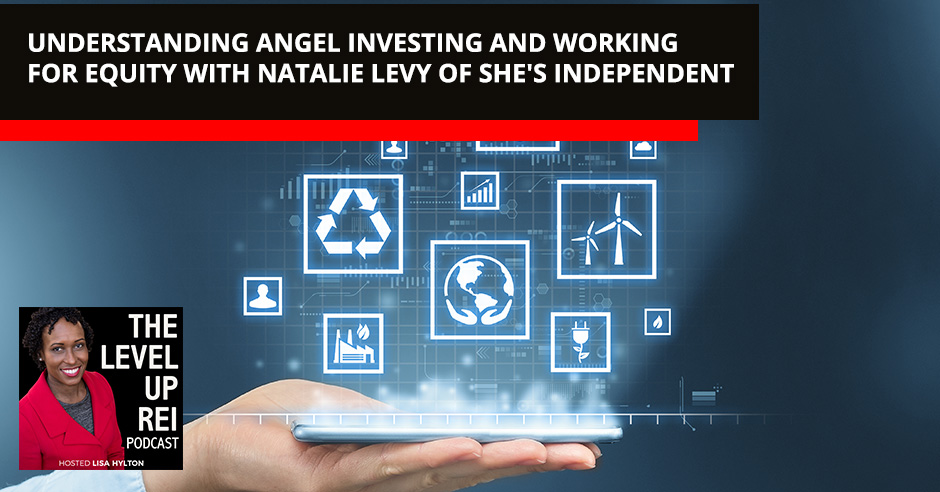
The economy has shifted where it offers more than basic investment opportunities. You can now diversify your portfolio and choose to dip into different categories. If investing is something you have been interested in or want to get into, this is the podcast for you! Founder & Mentor of She’s Independent, Natalie Levy, joins Lisa Hylton to talk about Angel Investing, its pros and cons, accreditations, and how it offers opportunities for diversification and building equity. She also shares insights on what you should look into as due diligence and how having an investor mindset and investing in yourself allows you to overcome challenges when investing in this space or with any endeavor you take on.
Use the code LevelUp to get 15% off all investment offerings at https://shesindependent.com/
—
Watch the episode here
Listen to the podcast here
Understanding Angel Investing And Working For Equity With Natalie Levy Of She’s Independent
I’m super excited to have Natalie Levy on the show. She comes from an institutional finance background, including derivatives trading, Angel investing, and private equity. She has a portfolio of 30 private investments and experienced investment returns of between 5 to 70X on all investments prior to 2018. She also runs the She’s Independent Investments, which focuses on gender equity, access, and impact. First of all, welcome Natalie to the show. I’m super happy to have you.
I remember this entire encounter came to be from a friend sending me an Eventbrite invite on what is Angel investing and thinking, “I want to learn about that.” I went and was like, “There’s so much information about investing in companies.” Granted, my show is about real estate but this episode is going to give you information about Angel investing, what it takes to invest in businesses, and most importantly, you are a startup yourself working for startups and companies. Many times, we are in situations where we’re working for nothing. We want to change that and be able to be educated about the questions that we need to be asking. I’m excited to have Natalie on. Welcome to the show, Natalie.
Thank you, Lisa. I’m so thrilled to be here. To elaborate on what you said, the piece about working for nothing, it’s working for nothing if you don’t negotiate a good equity package. We can get into that. Thank you for calling that out.
To kick things off, how did you get started investing in companies?
It’s an interesting journey. I’m an engineer by background. I went to Wall Street when I was much younger. I started Angel investing early. A few of the colleagues that I went through the analyst program with at a big bank started a member-led Angel group, and it was my first taste of investing in private assets. I started doing it more for access, being in the room, and wanting to challenge myself, and those investments paid off.
You can’t ever bank on the money but a fun journey of starting young and getting involved. I want to also mention that as a young woman on Wall Street, it was not easy. There are lots of MeToo moments. I’ve full circled to get back into finance on my own terms, and I’m proud and fulfilled to be doing what I’m doing with women.
Jumping right in, what is Angel investing anyway? How is it different from investing in stocks and all this other stuff?
A lot of people are probably talking about Angel investing these days. It’s this in-vogue thing to call yourself an Angel and be investing in private companies but understanding the fundamentals and how to do it in an intelligent way, people need to speak about this a lot more. Angel investing is basically, I am an individual who has enough assets or income so that I am qualified to invest in these very risky and private assets.
Most people are familiar with the stock market or maybe even real estate investing but Angel investing has extra stipulations. You can only invest if you meet the terms of an accredited investor by the SEC, and when you invest in allocated capital, it’s larger checks than those public market investments that you can get involved in. It’s for longer time horizons. You don’t know if you are going to have liquidity or the ability to exit or leave a position. It’s something that is a lot riskier, more opaque, and less information out there but an interesting market where you can invest in private companies and have tremendous upside if you are lucky and if you do the diligence to make sure you find good opportunities.
You work for nothing if you don't negotiate a good equity package. Share on XGiven your experience having done it because, in the bio, I said you have a portfolio of 30 private investments, experience investments, returns, and everything, what would you say are some of the key fundamentals that help to translate luck or at least help to compliment luck?
I say luck but you can be a good investor and lucky, and maybe you can be both. I’m probably a little bit of both. There are a lot of skills and learning through doing. This is a place where you are not going to learn about theoretical reading. It’s putting skin in the game or allocating and participating. It’s great to learn alongside others. Being in a member-led Angel group such as you are now in is a fantastic mechanism for learning. I also come from not just a finance and data background but I spent years in the tech operational world. I can translate skills that are spanning the data, finance, and frameworks with I care about traction, go-to-market people, and operators.
There’s a lot you can learn over time. One of the most important things and something that I stand by and a lot of other investors do is when you are investing early-stage, founders and execution matter. It is hard to build a business, and I will only invest in a business or in people where I say, “This person goes above and beyond. I see them executing and taking it to the next level and beyond,” but my investor mindset is always risk or reward.
If the reward or the opportunity isn’t big enough, I’m probably not going to look at it. I want to see if there’s enough of an opportunity, a good risk-reward profile, and a good founding or founder team where I can get behind it. Those are the real fundamentals. There is so much we could talk about there but I will pause there.
Talking about the founder’s matter, is it having a conversation one-time with the founder team, and you are making a decision based on that? How do you then be able to assess work ethic and that thing?
There are a lot of interactions you want to assess. The way that I run diligence, screening, and looking at companies before I invest is that it’s not one interaction. It’s how well are they executing even a fundraise because that says something about their execution capabilities, “Do they follow up? Are they detail-oriented? How smart are they?” You are assessing these things.
There are additional capabilities or things that I will dig into like, “What’s their background? Why is it this team? Why will this team make it work? Is it industry expertise? Is it relationships? What is it about that team?” The founding team matters. There’s a lot you can learn from early correspondence to how they pitch, follow up, how proactive they are, and how they manage other investors and the raise. These are all learning experiences asking tough questions.

Angel Investing: At the end of the day, make sure you trust the companies and the people you are investing in and believe it’s a good risk-return profile.
Connected to this, the companies that are coming to you come from a variety of different backgrounds. They are not one particular type of industry. You might have a medical or a startup in technology. I’m sure there was a variety of different industries. As an investor across your portfolio of 30, how do you bridge that to be able to assess them?
One of the concepts I will bring up here is the range, and it’s also the title of a book that I have been reading. It’s a lot of fun. Let’s talk about the diversity of people, backgrounds, and skillsets. I now run this member-led Angel group, where I have an institutional finance background but I love plugging in more people, predominantly women who come from different backgrounds. If I don’t know healthcare or biotech as well and somebody else does, then they can be the leader and expert that asks additional questions and helps on those deals.
One of my rules of investing is that I won’t invest by myself without other institutional investors investing. What does that mean? It’s not just my Angel group but we want other big investors who are running diligence and looking even deeper than we are at all the numbers on the data sheets. I’m running diligence but I’m also looking at others who I trust and have a high caliber who maybe even know the industry better than I do. That’s one way to de-risk.
Question regarding when institutions are investing alongside you in the real estate space, many times when that happens, the deals are structured, and they might come in at a more preferred part of the structure. That also means that if something was to happen to the investment, they are going to get paid first before the common gets paid. Is it similar?
No, and I love that. When you invest in an Angel round or an early-stage round of a business or any round, you are all getting the same terms for the most part. You are getting a term sheet, so you are getting the terms of that deal but in every case that I’ve invested, I believe I’ve had the same terms as all the other investors in that round.
There are even legalities around that they can’t do a different valuation at the same time. I work with founders that I trust and believe in, and a part of it is when you are signing on as an Angel or as an early investor in that round, everyone is getting the same terms. Part of why you want to make sure you have other good investors and smart investors is that you want to be negotiating for good terms.
When you bring up terms, I will be honest. Part of the reason why I joined your group is to learn about this. Are there key parts of the terms that you always look for or the baseline things that you are looking at?
When you're investing at the early stage, founders matter. Share on XAt the end of the day, I want to make sure that the companies and the people that I’m investing in I trust and believe it’s a good risk-return profile. There aren’t specific terms or things that I necessarily negotiate around because I am not a lead investor or a big investor in the cap table. I have a lawyer look at the documents to say, “Does this look good enough?” Understanding where you want to play and invest is important.
For me, I’ve had tremendous success in this seed plus or small A round. I’m not investing in a C-round, so I’m investing early enough where there’s a real opportunity for multiple or valuation expansion. If I’m only investing $10,000 or $20,000, that can be $100,000 or even maybe $1 million. Whereas, if I’m investing in companies that are already valued at $50 million or $100 million, I’m not going to make nearly as much.
Understanding where you want to play that’s what I look for in being more focused on the stage. I don’t think there are specific detailed terms but again, valuation is a part of the terms. That’s a way to answer your question where. I would always say good to have a lawyer or somebody who has a legal background where you are digging into the terms. If you have good institutional investors that are negotiating the term sheet, typically, it’s somewhat favorable to the investors.
Let’s talk a little bit about the member-led Angel group because that’s how you got introduced to it. You mentioned the iBanking company that you got started with, and people decided to put this member-led group together. Can you talk about some of the pros and cons of these member-led groups?
First of all, there are certain categories or areas that we learn nothing about in school or even when we graduate until we do the thing. Angel investing is a very clear type of thing that you don’t learn unless you have it in front of you or you happen to be in the room. I was very lucky regarding the member-led Angel group that I was a part of early on called Empire Angels happened to be some bright former or even current finance professionals. You had people that understood the fundamentals of dollars and data and pointed deep at businesses, and you got to learn alongside each other.
If somebody has expertise in one category or they are good at a certain type of process, you can all leverage each other’s skills. What I said on the investment group call that I had was, “I can’t do what I do without all of you,” because we charge nominal fees and nominal carried interest. It’s basically a take to management for what we do because, at the end of the day, we are not making a bunch of money but we are saying, “How do we operate this thing in a lean and efficient fashion?”
It’s having members step up and participate in activities and say, “I’m happy to do the screening. I’m happy to help lead diligence,” but the flip side of member-led and why an Angel group can operate in a not high caliber way is if people don’t have good backgrounds or are not doing detail diligence or not good with follow-up, it can fall apart. This mix of member-led and having people that are excited and maybe mission-driven and have an idea of what they are good at but then also having a mechanism of bringing people up to speed through mentorship, group learning or people who have a strong background that can teach others so that they can scale up and learn, that’s the secret sauce that we are bringing.

Angel Investing: Have a lawyer or somebody with a legal background with you when digging into the terms. It’s favorable when you have good institutional investors negotiating the term sheet.
That’s important. Through these member-led groups, that’s how you are able to then make investments of $10,000, $25,000 or $50,000. Maybe the investment minimum is probably higher than that for many of these different rounds of investing, which then creates opportunities for your group to get diversification. Speaking about diversification, I have been told in the past that it’s good to have somewhere between ten different Angel investments and no more than 10% of your net worth like any Angel investing, which is accurate as well.
To your earlier point, if you are writing checks that are $50,000 or $100,000, you can quickly get to that 10% mark for most people, and if you can even be an Angel investor or you are accredited. What we are doing is we are bringing down the investment minimum to $2,500, which is very low for a typical Angel round. It’s a great way to say, “Here’s access.”
Diversification absolutely is important. You don’t want to say, “I’m going to make these three investments and hope it works,” because the fact with Angel is that it’s very risky. There could be an interesting upside but you never want to bank on, “This investment is going to work.” Having a portfolio of, the number I hear more so is around twenty. It’s not like you are lugging in all at once but maybe over the next decade or whatever the timeframe is, you are making investments and building a portfolio, so you have that diversification.
If 5 of them go to nothing and 12 of them go sideways but not to nothing, and maybe 1 of them pays out, typically with Angel, a few winners are carrying the portfolio. When I got into Angel, the thing that was incredible was I said, “It’s play money, and it’s something that I can play with, and I’m going to have some interesting conversations, and I’m going to learn but I’m not banking on returns.” I got substantial returns but the fact that I achieved learning growth and confidence in what I was doing, it’s such an incredible thing. Not going in and saying, “I’m expecting a 20X on average return,” that’s insane. I achieved it but it’s insane. I don’t think you can ever expect that.
Connected to that, I want to touch on two things. One is the other opportunities that getting involved in member groups provides. Opportunities like maybe board access, depending on the skills that you already have, could be of value for some of the companies that are approaching the member-led group for fundraising. Let’s start with that.
It’s not about investing in financing with us. It’s about an ecosystem. You could theoretically learn about something but when you plug in and have companies at play where you are writing checks and having conversations, we love investing in women-owned but sometimes we invest in an executive team of all men. We have a conversation and say, “What’s going on with the culture? Are you investing in diversity? Are you investing in getting women on the board or the executive team?” We can even talk about placing potential candidates.
It’s this interesting and impactful thing that we are doing where it’s financing but it’s more than that. We now have this phenomenal group. You are a part of it. We might say, “Lisa could fit great and in alignment with this company into a board role or a strategic advisory role. Integrating into this ecosystem and saying, “Is there true diversity? What if some of the women in our network want to land boards?” It’s a great path to it. It’s learning and access but it’s beyond investing. It’s also the board and stepping into the senior roles.
Negotiating is a proven category where if you invest in the skills, you'll get better. Share on XFor anyone who’s reading this and they are like, “I’m not an accredited investor, so maybe I need to tune out,” don’t because one of the things that your group does is you have an observer role. Can you talk a little bit about this role that enables people to see it?
This is probably one of the biggest differentiators about us as an investing group. Who we are and what we do, which I’ve never seen another Angel group that says, “Are you not accredited? We have a role for you.” What I’m excited about are that access and education. I had a Brown woman in residency who learned about investing and negotiating through us. She’s independent. She said, “I’m not accredited but I’m interested.” I went to the lawyers and said, “We need to do something here.”
Now, about a third of our members are what we call investment observers. They can learn it every step of the journey. They can’t listen to live pitches but can listen to recordings, get to participate, ask questions, and go through our educational series. It’s a path. Even if they are not going to write checks this year, next year or frankly ever, it’s learning.
It’s still gaining the confidence and the skills so that they can still be thinking about navigating into these very senior roles, maybe board roles, strategic advisory roles or to your point, when they are negotiating things like their equity comp or options, they can do it with confidence and in such a way where you are stepping into investor status even if you are not accredited. It’s exciting.
That leads me nicely into the second part of this interview, which is one of the biggest value-adds that we can give to the world, which is our time and working for companies or startups. Many people are out there who desire to work for equity and in addition to their compensation. Something that I also enjoyed about the part of your investment group here is that you are giving education about negotiating for that. Where I want to start is with some of the misconceptions that many people have when it comes to going into a job and negotiating equity.
First of all, you can’t negotiate if you don’t understand the thing. It’s an underserved or area that we don’t learn about unless we are active investors that most employees or individuals can’t even begin to negotiate here. Starting to understand the framework of, “What is an equity package? Can I ask for more?” You can’t ask for more if you don’t understand it.
The basics to dig into are how you talk about equity and this ownership. I’ve had way too many people talk about shares, “I have 20,000 shares.” “What does that mean? What’s it worth? What was the last valuation? What’s the percentage of ownership?” You have to start digging in and peeling back those layers. What is your role? I want to remind people that when it comes to employer negotiations, you can almost always negotiate. The reason I say almost is sometimes there’s a very strict and regulated amount or the board has already agreed, “This is how the packages work,” but you can almost always negotiate.

Angel Investing: If you don’t believe that you’re worth it or don’t feel good or confident, and it comes across, that’s going to stop the negotiation right there.
The other way to think about equity is that it may pay off, it may not but it’s typically a lot cheaper to give away than cash. If I’m going into a new employer, I absolutely am going to want to negotiate the equity. I probably want to negotiate everything because I like to negotiate. I know my value but the equity comp can almost always be negotiated.
To give you an idea of that. Things like the cliff and the vesting schedule are much harder to negotiate. If you are a very senior executive, maybe that’s different. If you are a board member or an advisor, you can negotiate those but for a typical employee, the cliff and the vesting schedule, meaning when do you start getting ownership and how long does it take, that’s a lot harder.
What’s on the table for any employee negotiation is, “How much ownership?” When you start digging in and understanding the concepts, “Lisa, we are going to give you 20,000 shares,” and you say, “I appreciate that but I look at the last valuation, the numbers, and $10,000 of equity comp, it’s negligible. I don’t want whatever you said. I need 5X that because 50,000 is more in line with,” and you should get more but starting to have that dialogue.
It’s very important. One other thing that you said here that stuck with me is that you like to negotiate. I don’t know if a lot of women can say confidently that they enjoy negotiating. I would love to know from you what advice you would give to other people who the word negotiating makes them want to run for the hills.
One thing is that negotiating is clearly a proven category where if you invest in the skills, you will get better. A lot of people say, “I wasn’t born a negotiator. This isn’t my skillset,” but let me repeat that. If you invest in these skills, you will get better. One of the biggest takeaways, learnings or gaps for a lot of women identifying is we were raised in this society, this family or workplace where it was, “Say, yes. Don’t say no. Be happy and smile. Make people feel good. Do the work.” We weren’t taught that it’s okay to not only ask for things but that no is okay. Hitting an obstacle is okay.
There’s so much growth through those obstacles or challenges when you get to know that’s not a bad thing. It’s just discomfort in sitting with it and saying, “What can I learn from this? How do I maybe turn it into a yes?” Those young boys on the playground in fourth grade were asking out the girls and getting turned down. They were learning about no. The women, the young girls in us, took longer, and some of us are still dealing with that. “How am I with pushback? Am I okay with no?” The sooner you can get to that, recognizing there’s so much growth through. If you never hear no, you probably have a lot more room to grow. It’s understanding that.
That’s important because that’s key in negotiating a good package for yourself. It’s one thing also to get educated and know what you are worth and need to be asking for. It’s a whole other ball game to also then have the courage to say, “Ask for what you want,” and to be willing to walk away from opportunities that are not a good fit for you.
More men are comfortable asking for raises. Women do ask, but men ask for a higher amount. Share on XConnected to that, I read somewhere or listened to one of your videos where you talked about how you had a track record of negotiating raises for yourself with current employers with packages and stuff like that. I was very impressed. I was like, “This is good to know.” Would you say that sometimes other people or colleagues are doing similar things as well? It’s just that many times people are not sharing that in the workplace.
You can absolutely negotiate with an existing employer and already proven value. When you have backup offers, that’s obviously a great position to be in if you are thinking about leaving. When I’ve got 40% plus year-over-year pay increases because my employer was like, “we need to keep you.” They have given increases to my colleagues because of the negotiation I did, and them recognizing that I battled for what they were was showing them that they were underpaying other employees as well.
I do think that on the whole, more men are comfortable asking for raises or asking for more. However, I’ve also seen stats where women ask but men ask for a higher amount. Men might ask for 30% more than women do, which is going to influence the number. One concept is hugely important when you are thinking about negotiations. It’s not about the number and the bottom line of it. It’s, “Are you confident, and how do you deliver it?”
It’s the mindset. If you don’t believe that you don’t feel good or confident, and it comes across, that’s going to stop the negotiation right there. If you can embody and know your value and your worth, you’ve done the research prep, and this is the thing you are asking for. It’s not only fair. It’s deserved, and this is what you need. You are going to show up completely differently in that conversation.
I want to circle back to the compensation and the equity specifically. I had a friend who was also in the startup space. He said how his first couple of roles didn’t do a good job at choosing the companies that the startups he chose to work for. What changed for him was that when he started to think about the company from an investor perspective, he felt that he chose better companies to work for. I don’t know if you share the same sentiment but we did talk about that not all startups are equal in terms of choosing to work for different startups. Are there things that people should be looking for or even taking into consideration when deciding to invest their time?
The investor mindset, whether or not you are writing checks, is hugely helpful in a number of areas, and this is one of them, which is finding and identifying where you want to work. At the end of the day, if you are going to spend years or whatever it is committing to and spending all those hours and getting excited about an equity package or the prospect of growing into bigger roles in this organization, “Does it have legs? Do we think it’s heading anywhere good?” If you start thinking like an investor, you can start digging in and asking these questions.
If I’m going to join a startup, which I’m not anymore because now I do more advisory board and investing roles but if I were you and you are looking at joining a startup in this environment, what’s your runway? If you didn’t fundraise, when are you running out of capital? Look at what the market is doing, and fundraising is a lot tougher. To quote where we are, it’s September 2022.

Angel Investing: People don’t leave companies because of pay; they leave because of bad managers. So make sure you’re really de-risking on the role you step into because it’s a big decision when you step into a new role.
Make sure you are asking questions, “What is traction? What is growth? What are the plans with the business?” In an investor mindset, “How good are the leaders? How good are the founders of that business? Are they hiring and filling gaps if they don’t have the background?” At the end of the day, a lot of founders have what we will call founder brain fog, where they tell the story that they believe but isn’t necessarily what’s happening. I’ve learned a lot as an investor, and so I would probably do even deeper diligence if I was looking at startups to work at.
Think about it like this investing. You are writing a check. When you work at a company, you are going to be there for a long time or even six months or a year. It’s a lot of your time and effort. Make sure you are asking a lot of questions. It shouldn’t be them interviewing you. You need to interview them as well, in terms of culture and where they are in their business, “Do you like the role.” When it comes down to it, people also don’t leave companies because of pay. They are leaving because of bad managers. Making sure that you are de-risking on the role that you step into because it’s a big decision when you step into the new role.
Thank you so much, Natalie, for coming on. There was so much. There are even more guys. If my readers want to learn more about you and the She’s Independent Investment Club, where can they go to learn more?
Check out ShesIndependent.com, and we will set up a promo code for your readers. It’s LEVELUP, and we will offer 15% off of our investment group offerings. There is a path for you if you are not accredited and if you are. Join Lisa and I. We would love to see you there.
It was a pleasure. Thank you so much for coming on.
Thank you so much.
Important Liks
About Natalie Levy
 Passionate about pushing boundaries and being independent from a young age, she holds a BSE of Industrial Engineering and minor in Mathematics graduating Magna Cum Laude from the University of Michigan. She has held roles in derivatives trading at Citigroup, enterprise data sales and operations at numerous technology businesses including Bloomberg and early stage ventures. She led business development efforts for private equity investor Turn/River Capital which was focused around SaaS and go-to-market optimizations. She currently resides in Boulder with her loving rescue pup Bina and operates in a fractional executive capacity alongside staying active in early stage growth businesses as an investor and advisor.
Passionate about pushing boundaries and being independent from a young age, she holds a BSE of Industrial Engineering and minor in Mathematics graduating Magna Cum Laude from the University of Michigan. She has held roles in derivatives trading at Citigroup, enterprise data sales and operations at numerous technology businesses including Bloomberg and early stage ventures. She led business development efforts for private equity investor Turn/River Capital which was focused around SaaS and go-to-market optimizations. She currently resides in Boulder with her loving rescue pup Bina and operates in a fractional executive capacity alongside staying active in early stage growth businesses as an investor and advisor.
Following the loss of her mother to suicide in January 2019, Natalie launched She’s Independent while she transitioned from corporate roles to a more entrepreneurial and balanced lifestyle. She grew through the loss and continues on her healing journey to discover what is authentically aligned and enjoys tapping into her professional superpowers that also highlight self-awareness and personal growth. Through She’s Independent, Natalie offers coaching and mentorship from professional confidence and salary negotiation to business strategy, including go-to-market and fundraising.
Love the show? Subscribe, rate, review, and share!
Join The Level Up REI Podcast Community today:

Recent Comments